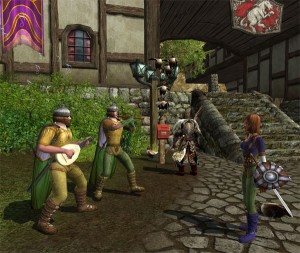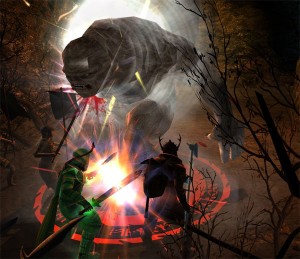This was tough, but we’ve got the winner in our Lord of the Rings Online: Mines of Moria contest. We had some great entries submitted to us in comments and via email, but there can be only one winner. Some submissions were wonderfully provocative, some cut to the quick. I had it down to three possible winners, Jeff helped me cut it to two, and I kept waffling.

A pair of players perform holidays songs outside the Prancing Pony (while chickens dance on a mailbox).
Then, while I was playing LOTRO myself one night, it became clear. I watched the people chat on public channels, sharing advice and directions with one another. I joined one fellowship and then another, over the course of the evening, each time encountering pairs or trios of players who already new each other from previous quests and had a rapport. I remembered a pair of PCs, back in December, playing holiday music outside the Prancing Pony in Bree — and they weren’t half bad.
Much to my surprise, this isn’t that uncommon. Now and again, some player chooses to spend his or her time playing music for passersby. They don’t all play great, but I’ve never seen some griefer balladeer just making noise to spoil our fun.
Thinking on it, now, I’m sort of stunned that I’ve had my “hear player-created music?” option turned on all this time. But I’ve never had reason to turn it off. That’s kind of amazing.
This, more or less, is what the winning entry is about. It came in via email from Adam Drew. Here it is (copy edited a bit by me):
The thing I learned while playing MMOs is the same thing I’ve learned playing every other game: it doesn’t matter what you are playing nearly as much as it matters who you are playing it with. The worst game in the world can still be a hell of a lot of fun if you play it in good company, and no high-tech wizardry under a thousand virtual suns will save a game if you’re playing it with people you can’t abide.
There’s a message in here that applies to all games, which is certainly good, but that’s not why I picked it. This lesson got me thinking a lot, again, about how MMOGs both depend on players to function and try to defy the ability of players to ruin the game for others. The game has to smooth the play experience and convince us to break the rules we all have about not playing with people we cannot abide.
A board game doesn’t quite have to worry about this. Presumably you simply won’t invite jackasses over to play Scrabble unless you’re willing to tolerate some jackassery. In poker you can get stuck playing with people you wouldn’t let into your house, but at least you can make some money.
With hundreds of thousands of players running around your MMORPG of choice, you simply cannot escape the ugly fact: some of those players are going to irk the hell out of you. MMOG designers have to make their games as jerk-resistant as possible. And tweaking the gameplay isn’t enough. Players need tools to express and protect themselves socially, to silence gold-selling spammers and ward off louts.
When I can, I informally poll other players on my LOTRO server about what it is that brings them to that game instead of WoW or WAR. The second-most-common answer? They’re Tolkien fans. The most common answer? The players are more helpful and more mature, in general, than they are in Azeroth.
Even with the ability to control your own level of involvement in the game’s unique culture, the game experience is going to be influenced by the gestalt personality of the local server.
Take, for example, a story that broke last week from inside EVE Online, in which a single player appears to have embezzled something like 80 billion ISK (that’s EVE-dollars) from a player-run in-game bank. That money belonged to other players, but that’s the kind of shenanigans you opt in for in EVE Online‘s cutthroat world of ruthless spreadsheets, corporate warfare, and anarchic capitalism.
(While we’re on the subject, here’s an article at The Escapist, about griefers in WoW, that’s stuck with me.)
I learned pretty quickly the pains of playing Halo or Splinter Cell (or Wolfenstein or Gears of War or Call of Duty) with complete strangers on Xbox Live. More often than not, the luck of the draw just didn’t net the most, uh, personable players. I mean, I like those games plenty, but not one has a multiplayer experience so sublime that it’s worth spending much time on a headset with the rage zombies from 28 Days Later.
Anyway. Congratulations, Adam! Your Complete Edition of Lord of the Rings Online: Mines of Moria and your copy of Things We Think About Games are on their way to you.
Thanks again to everyone who wrote in and commented.


Any chance of hearing some of the also-rans?
The good thing about a game like LOTR is that it does cater to a certain niche market. Yes, I am sure there are those that are in for the game alone, absent of all context. But for the most part, the players are there to indulge in their own appreciation for the source material, be that the books or the movies. And so — at least in my experience — they extend that appreciation toward their fellow players.
You can see those submitted as comments to the original post here. I decided not to include other entries in this post to keep some focus on the winning submission.
We didn’t get that many, really. I offered the email option under the assumption that not everyone would want to post their entry publicly, but anyone who submitted their entry via email is welcome to post it here in the comments.
I think every entry we got was worth discussing, so don’t be shy, folks.
Hey, I came over here by way of Ellis’ Whitechapel boards. It was really nice to see this post — I was a developer on LOTRO, so it’s always wonderful to see what people like about it. Subscribing to your blog now, too.
I only posted my submission by email to allow someone else to post the same idea: if someone else came to the same conclusion and phrased it better, or added some insight, then they deserved to win. I didn’t want to discourage anyone who might have had the same idea, AND, I didn’t want someone to take my idea and refine it to be better than my original idea.
That said, I think one corollary to the lesson that “games are about who you play them with” is something that came up recently on a boardgame blog I read: different crowds will -make- different games fun. Snakes and ladders is a terrible game for adults to play, since it’s barely a “game” at all. But if you want to kill some time with a 4-year-old, suddenly S&L is great fun!
On the other end, playing the Battlestar Galactica boardgame with its traitors and complex rules would be a waste of time with a non-fan, or someone who couldn’t buy into the web of lies and distrust that make the game so tense, but if someone has even seen a handful of episodes, then they will click with it.
For what it’s worth, speaking as a (BSG) non-fan, I dug the BSG boardgame design. I think it transcends the license. (I don’t have anything against the show. I just don’t have the time to invest.)
@ Jeff:
Then you would probably fall into the “someone who [can] buy into the web of lies and distrust that make the game so tense” exemption.
I just think it’s more fun when you can call someone “stinking toaster” and really mean it.
Whoops! Reading too fast and misread “or” for an additional definition of “non-fan.”
Ah, my bad. It does kinda look like apposition. Damned inconsistent language!